Exploring Recovery in Mental Health Nursing: Therapeutic Alliances
VerifiedAdded on 2023/06/10
|7
|2421
|319
Essay
AI Summary
This essay provides a comprehensive overview of recovery in mental health nursing, emphasizing the importance of therapeutic alliances and recovery-oriented practices. It discusses the meaning of recovery in mental healthcare, identifies key principles, and explores how recovery is applied in various healthcare settings. The essay also examines the role of psychiatric nurses in fostering therapeutic relationships with patients, highlighting the significance of these alliances in promoting recovery. It further elaborates on the different phases of therapeutic alliance, including the orientation, working, and termination phases, and underscores the principles associated with mental health recovery, such as self-direction, holistic approach, and self-empowerment. The essay concludes by emphasizing the shift from clinical approaches to personal recovery, leading to more effective outcomes in mental health treatment. Desklib provides a platform for students to access similar solved assignments and past papers.
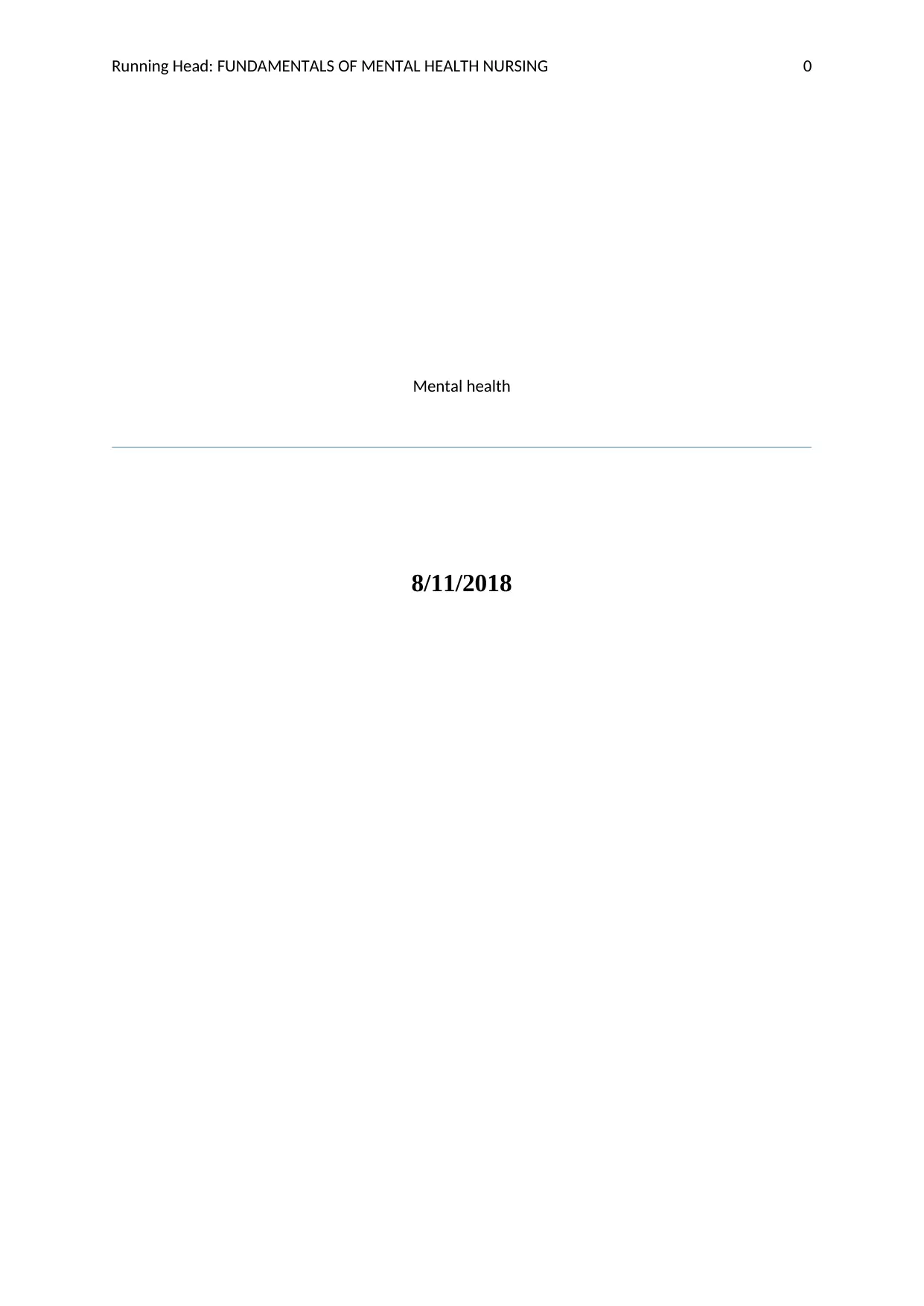
Running Head: FUNDAMENTALS OF MENTAL HEALTH NURSING 0
Mental health
8/11/2018
Mental health
8/11/2018
Paraphrase This Document
Need a fresh take? Get an instant paraphrase of this document with our AI Paraphraser
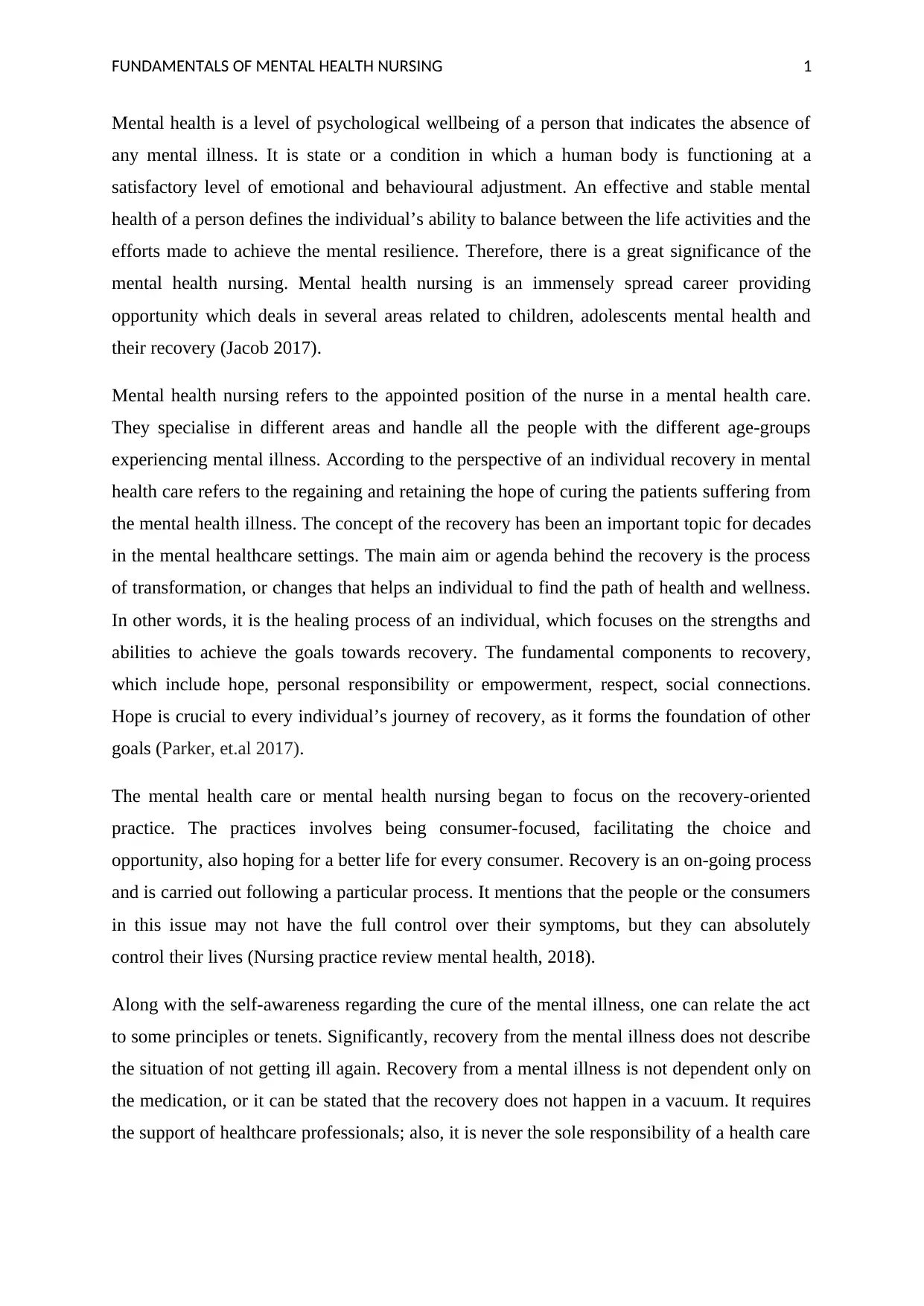
FUNDAMENTALS OF MENTAL HEALTH NURSING 1
Mental health is a level of psychological wellbeing of a person that indicates the absence of
any mental illness. It is state or a condition in which a human body is functioning at a
satisfactory level of emotional and behavioural adjustment. An effective and stable mental
health of a person defines the individual’s ability to balance between the life activities and the
efforts made to achieve the mental resilience. Therefore, there is a great significance of the
mental health nursing. Mental health nursing is an immensely spread career providing
opportunity which deals in several areas related to children, adolescents mental health and
their recovery (Jacob 2017).
Mental health nursing refers to the appointed position of the nurse in a mental health care.
They specialise in different areas and handle all the people with the different age-groups
experiencing mental illness. According to the perspective of an individual recovery in mental
health care refers to the regaining and retaining the hope of curing the patients suffering from
the mental health illness. The concept of the recovery has been an important topic for decades
in the mental healthcare settings. The main aim or agenda behind the recovery is the process
of transformation, or changes that helps an individual to find the path of health and wellness.
In other words, it is the healing process of an individual, which focuses on the strengths and
abilities to achieve the goals towards recovery. The fundamental components to recovery,
which include hope, personal responsibility or empowerment, respect, social connections.
Hope is crucial to every individual’s journey of recovery, as it forms the foundation of other
goals (Parker, et.al 2017).
The mental health care or mental health nursing began to focus on the recovery-oriented
practice. The practices involves being consumer-focused, facilitating the choice and
opportunity, also hoping for a better life for every consumer. Recovery is an on-going process
and is carried out following a particular process. It mentions that the people or the consumers
in this issue may not have the full control over their symptoms, but they can absolutely
control their lives (Nursing practice review mental health, 2018).
Along with the self-awareness regarding the cure of the mental illness, one can relate the act
to some principles or tenets. Significantly, recovery from the mental illness does not describe
the situation of not getting ill again. Recovery from a mental illness is not dependent only on
the medication, or it can be stated that the recovery does not happen in a vacuum. It requires
the support of healthcare professionals; also, it is never the sole responsibility of a health care
Mental health is a level of psychological wellbeing of a person that indicates the absence of
any mental illness. It is state or a condition in which a human body is functioning at a
satisfactory level of emotional and behavioural adjustment. An effective and stable mental
health of a person defines the individual’s ability to balance between the life activities and the
efforts made to achieve the mental resilience. Therefore, there is a great significance of the
mental health nursing. Mental health nursing is an immensely spread career providing
opportunity which deals in several areas related to children, adolescents mental health and
their recovery (Jacob 2017).
Mental health nursing refers to the appointed position of the nurse in a mental health care.
They specialise in different areas and handle all the people with the different age-groups
experiencing mental illness. According to the perspective of an individual recovery in mental
health care refers to the regaining and retaining the hope of curing the patients suffering from
the mental health illness. The concept of the recovery has been an important topic for decades
in the mental healthcare settings. The main aim or agenda behind the recovery is the process
of transformation, or changes that helps an individual to find the path of health and wellness.
In other words, it is the healing process of an individual, which focuses on the strengths and
abilities to achieve the goals towards recovery. The fundamental components to recovery,
which include hope, personal responsibility or empowerment, respect, social connections.
Hope is crucial to every individual’s journey of recovery, as it forms the foundation of other
goals (Parker, et.al 2017).
The mental health care or mental health nursing began to focus on the recovery-oriented
practice. The practices involves being consumer-focused, facilitating the choice and
opportunity, also hoping for a better life for every consumer. Recovery is an on-going process
and is carried out following a particular process. It mentions that the people or the consumers
in this issue may not have the full control over their symptoms, but they can absolutely
control their lives (Nursing practice review mental health, 2018).
Along with the self-awareness regarding the cure of the mental illness, one can relate the act
to some principles or tenets. Significantly, recovery from the mental illness does not describe
the situation of not getting ill again. Recovery from a mental illness is not dependent only on
the medication, or it can be stated that the recovery does not happen in a vacuum. It requires
the support of healthcare professionals; also, it is never the sole responsibility of a health care
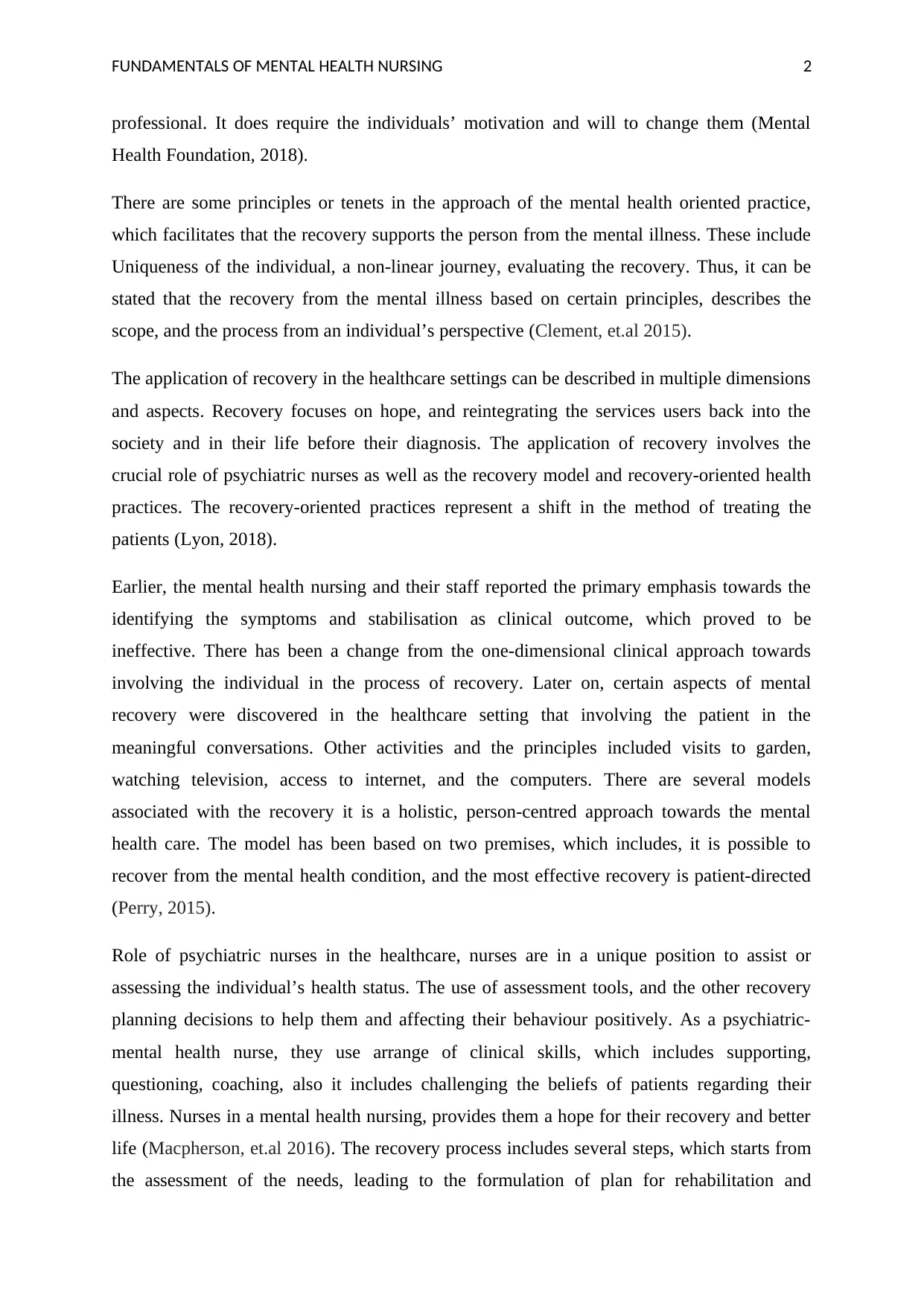
FUNDAMENTALS OF MENTAL HEALTH NURSING 2
professional. It does require the individuals’ motivation and will to change them (Mental
Health Foundation, 2018).
There are some principles or tenets in the approach of the mental health oriented practice,
which facilitates that the recovery supports the person from the mental illness. These include
Uniqueness of the individual, a non-linear journey, evaluating the recovery. Thus, it can be
stated that the recovery from the mental illness based on certain principles, describes the
scope, and the process from an individual’s perspective (Clement, et.al 2015).
The application of recovery in the healthcare settings can be described in multiple dimensions
and aspects. Recovery focuses on hope, and reintegrating the services users back into the
society and in their life before their diagnosis. The application of recovery involves the
crucial role of psychiatric nurses as well as the recovery model and recovery-oriented health
practices. The recovery-oriented practices represent a shift in the method of treating the
patients (Lyon, 2018).
Earlier, the mental health nursing and their staff reported the primary emphasis towards the
identifying the symptoms and stabilisation as clinical outcome, which proved to be
ineffective. There has been a change from the one-dimensional clinical approach towards
involving the individual in the process of recovery. Later on, certain aspects of mental
recovery were discovered in the healthcare setting that involving the patient in the
meaningful conversations. Other activities and the principles included visits to garden,
watching television, access to internet, and the computers. There are several models
associated with the recovery it is a holistic, person-centred approach towards the mental
health care. The model has been based on two premises, which includes, it is possible to
recover from the mental health condition, and the most effective recovery is patient-directed
(Perry, 2015).
Role of psychiatric nurses in the healthcare, nurses are in a unique position to assist or
assessing the individual’s health status. The use of assessment tools, and the other recovery
planning decisions to help them and affecting their behaviour positively. As a psychiatric-
mental health nurse, they use arrange of clinical skills, which includes supporting,
questioning, coaching, also it includes challenging the beliefs of patients regarding their
illness. Nurses in a mental health nursing, provides them a hope for their recovery and better
life (Macpherson, et.al 2016). The recovery process includes several steps, which starts from
the assessment of the needs, leading to the formulation of plan for rehabilitation and
professional. It does require the individuals’ motivation and will to change them (Mental
Health Foundation, 2018).
There are some principles or tenets in the approach of the mental health oriented practice,
which facilitates that the recovery supports the person from the mental illness. These include
Uniqueness of the individual, a non-linear journey, evaluating the recovery. Thus, it can be
stated that the recovery from the mental illness based on certain principles, describes the
scope, and the process from an individual’s perspective (Clement, et.al 2015).
The application of recovery in the healthcare settings can be described in multiple dimensions
and aspects. Recovery focuses on hope, and reintegrating the services users back into the
society and in their life before their diagnosis. The application of recovery involves the
crucial role of psychiatric nurses as well as the recovery model and recovery-oriented health
practices. The recovery-oriented practices represent a shift in the method of treating the
patients (Lyon, 2018).
Earlier, the mental health nursing and their staff reported the primary emphasis towards the
identifying the symptoms and stabilisation as clinical outcome, which proved to be
ineffective. There has been a change from the one-dimensional clinical approach towards
involving the individual in the process of recovery. Later on, certain aspects of mental
recovery were discovered in the healthcare setting that involving the patient in the
meaningful conversations. Other activities and the principles included visits to garden,
watching television, access to internet, and the computers. There are several models
associated with the recovery it is a holistic, person-centred approach towards the mental
health care. The model has been based on two premises, which includes, it is possible to
recover from the mental health condition, and the most effective recovery is patient-directed
(Perry, 2015).
Role of psychiatric nurses in the healthcare, nurses are in a unique position to assist or
assessing the individual’s health status. The use of assessment tools, and the other recovery
planning decisions to help them and affecting their behaviour positively. As a psychiatric-
mental health nurse, they use arrange of clinical skills, which includes supporting,
questioning, coaching, also it includes challenging the beliefs of patients regarding their
illness. Nurses in a mental health nursing, provides them a hope for their recovery and better
life (Macpherson, et.al 2016). The recovery process includes several steps, which starts from
the assessment of the needs, leading to the formulation of plan for rehabilitation and
⊘ This is a preview!⊘
Do you want full access?
Subscribe today to unlock all pages.

Trusted by 1+ million students worldwide
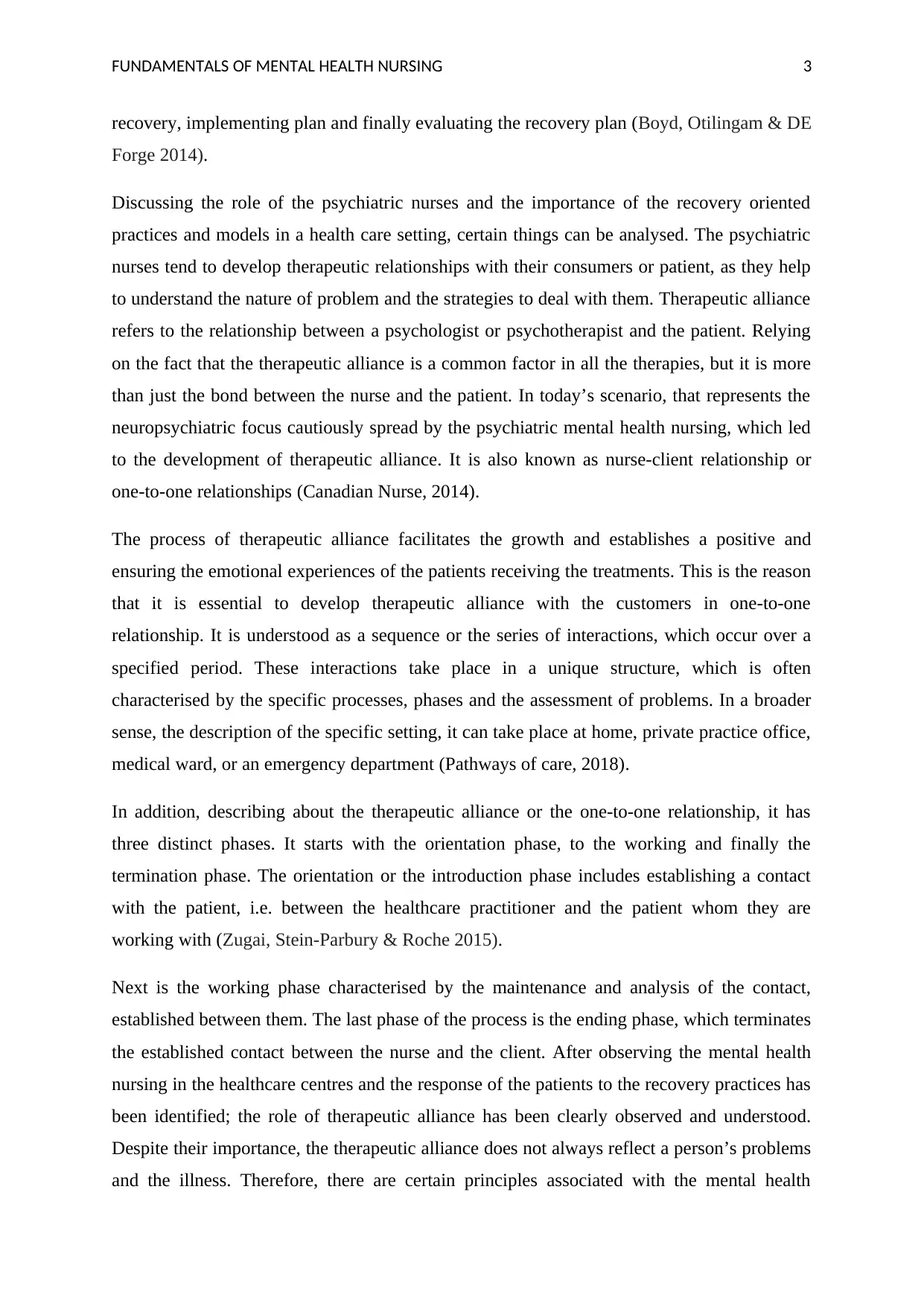
FUNDAMENTALS OF MENTAL HEALTH NURSING 3
recovery, implementing plan and finally evaluating the recovery plan (Boyd, Otilingam & DE
Forge 2014).
Discussing the role of the psychiatric nurses and the importance of the recovery oriented
practices and models in a health care setting, certain things can be analysed. The psychiatric
nurses tend to develop therapeutic relationships with their consumers or patient, as they help
to understand the nature of problem and the strategies to deal with them. Therapeutic alliance
refers to the relationship between a psychologist or psychotherapist and the patient. Relying
on the fact that the therapeutic alliance is a common factor in all the therapies, but it is more
than just the bond between the nurse and the patient. In today’s scenario, that represents the
neuropsychiatric focus cautiously spread by the psychiatric mental health nursing, which led
to the development of therapeutic alliance. It is also known as nurse-client relationship or
one-to-one relationships (Canadian Nurse, 2014).
The process of therapeutic alliance facilitates the growth and establishes a positive and
ensuring the emotional experiences of the patients receiving the treatments. This is the reason
that it is essential to develop therapeutic alliance with the customers in one-to-one
relationship. It is understood as a sequence or the series of interactions, which occur over a
specified period. These interactions take place in a unique structure, which is often
characterised by the specific processes, phases and the assessment of problems. In a broader
sense, the description of the specific setting, it can take place at home, private practice office,
medical ward, or an emergency department (Pathways of care, 2018).
In addition, describing about the therapeutic alliance or the one-to-one relationship, it has
three distinct phases. It starts with the orientation phase, to the working and finally the
termination phase. The orientation or the introduction phase includes establishing a contact
with the patient, i.e. between the healthcare practitioner and the patient whom they are
working with (Zugai, Stein-Parbury & Roche 2015).
Next is the working phase characterised by the maintenance and analysis of the contact,
established between them. The last phase of the process is the ending phase, which terminates
the established contact between the nurse and the client. After observing the mental health
nursing in the healthcare centres and the response of the patients to the recovery practices has
been identified; the role of therapeutic alliance has been clearly observed and understood.
Despite their importance, the therapeutic alliance does not always reflect a person’s problems
and the illness. Therefore, there are certain principles associated with the mental health
recovery, implementing plan and finally evaluating the recovery plan (Boyd, Otilingam & DE
Forge 2014).
Discussing the role of the psychiatric nurses and the importance of the recovery oriented
practices and models in a health care setting, certain things can be analysed. The psychiatric
nurses tend to develop therapeutic relationships with their consumers or patient, as they help
to understand the nature of problem and the strategies to deal with them. Therapeutic alliance
refers to the relationship between a psychologist or psychotherapist and the patient. Relying
on the fact that the therapeutic alliance is a common factor in all the therapies, but it is more
than just the bond between the nurse and the patient. In today’s scenario, that represents the
neuropsychiatric focus cautiously spread by the psychiatric mental health nursing, which led
to the development of therapeutic alliance. It is also known as nurse-client relationship or
one-to-one relationships (Canadian Nurse, 2014).
The process of therapeutic alliance facilitates the growth and establishes a positive and
ensuring the emotional experiences of the patients receiving the treatments. This is the reason
that it is essential to develop therapeutic alliance with the customers in one-to-one
relationship. It is understood as a sequence or the series of interactions, which occur over a
specified period. These interactions take place in a unique structure, which is often
characterised by the specific processes, phases and the assessment of problems. In a broader
sense, the description of the specific setting, it can take place at home, private practice office,
medical ward, or an emergency department (Pathways of care, 2018).
In addition, describing about the therapeutic alliance or the one-to-one relationship, it has
three distinct phases. It starts with the orientation phase, to the working and finally the
termination phase. The orientation or the introduction phase includes establishing a contact
with the patient, i.e. between the healthcare practitioner and the patient whom they are
working with (Zugai, Stein-Parbury & Roche 2015).
Next is the working phase characterised by the maintenance and analysis of the contact,
established between them. The last phase of the process is the ending phase, which terminates
the established contact between the nurse and the client. After observing the mental health
nursing in the healthcare centres and the response of the patients to the recovery practices has
been identified; the role of therapeutic alliance has been clearly observed and understood.
Despite their importance, the therapeutic alliance does not always reflect a person’s problems
and the illness. Therefore, there are certain principles associated with the mental health
Paraphrase This Document
Need a fresh take? Get an instant paraphrase of this document with our AI Paraphraser
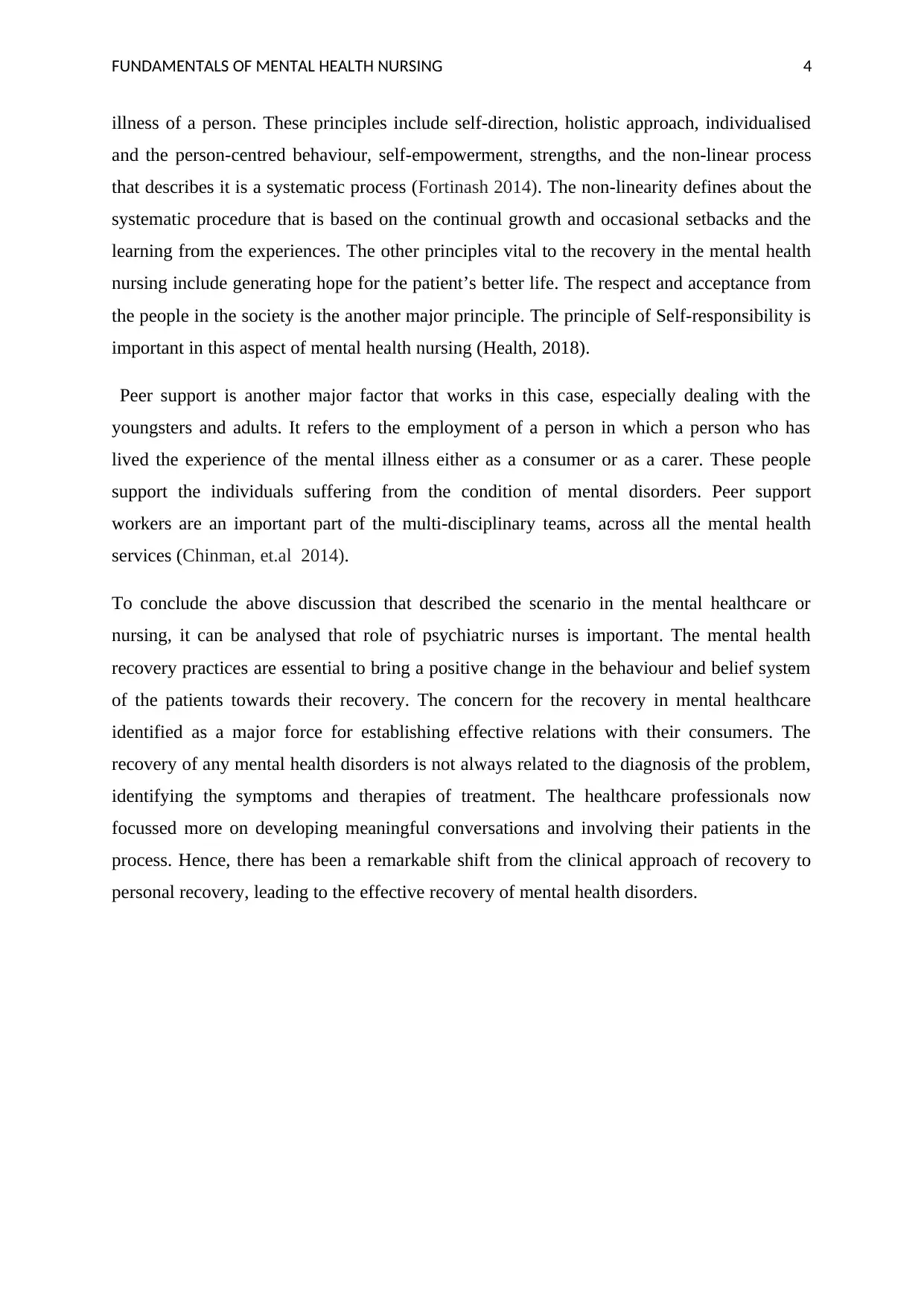
FUNDAMENTALS OF MENTAL HEALTH NURSING 4
illness of a person. These principles include self-direction, holistic approach, individualised
and the person-centred behaviour, self-empowerment, strengths, and the non-linear process
that describes it is a systematic process (Fortinash 2014). The non-linearity defines about the
systematic procedure that is based on the continual growth and occasional setbacks and the
learning from the experiences. The other principles vital to the recovery in the mental health
nursing include generating hope for the patient’s better life. The respect and acceptance from
the people in the society is the another major principle. The principle of Self-responsibility is
important in this aspect of mental health nursing (Health, 2018).
Peer support is another major factor that works in this case, especially dealing with the
youngsters and adults. It refers to the employment of a person in which a person who has
lived the experience of the mental illness either as a consumer or as a carer. These people
support the individuals suffering from the condition of mental disorders. Peer support
workers are an important part of the multi-disciplinary teams, across all the mental health
services (Chinman, et.al 2014).
To conclude the above discussion that described the scenario in the mental healthcare or
nursing, it can be analysed that role of psychiatric nurses is important. The mental health
recovery practices are essential to bring a positive change in the behaviour and belief system
of the patients towards their recovery. The concern for the recovery in mental healthcare
identified as a major force for establishing effective relations with their consumers. The
recovery of any mental health disorders is not always related to the diagnosis of the problem,
identifying the symptoms and therapies of treatment. The healthcare professionals now
focussed more on developing meaningful conversations and involving their patients in the
process. Hence, there has been a remarkable shift from the clinical approach of recovery to
personal recovery, leading to the effective recovery of mental health disorders.
illness of a person. These principles include self-direction, holistic approach, individualised
and the person-centred behaviour, self-empowerment, strengths, and the non-linear process
that describes it is a systematic process (Fortinash 2014). The non-linearity defines about the
systematic procedure that is based on the continual growth and occasional setbacks and the
learning from the experiences. The other principles vital to the recovery in the mental health
nursing include generating hope for the patient’s better life. The respect and acceptance from
the people in the society is the another major principle. The principle of Self-responsibility is
important in this aspect of mental health nursing (Health, 2018).
Peer support is another major factor that works in this case, especially dealing with the
youngsters and adults. It refers to the employment of a person in which a person who has
lived the experience of the mental illness either as a consumer or as a carer. These people
support the individuals suffering from the condition of mental disorders. Peer support
workers are an important part of the multi-disciplinary teams, across all the mental health
services (Chinman, et.al 2014).
To conclude the above discussion that described the scenario in the mental healthcare or
nursing, it can be analysed that role of psychiatric nurses is important. The mental health
recovery practices are essential to bring a positive change in the behaviour and belief system
of the patients towards their recovery. The concern for the recovery in mental healthcare
identified as a major force for establishing effective relations with their consumers. The
recovery of any mental health disorders is not always related to the diagnosis of the problem,
identifying the symptoms and therapies of treatment. The healthcare professionals now
focussed more on developing meaningful conversations and involving their patients in the
process. Hence, there has been a remarkable shift from the clinical approach of recovery to
personal recovery, leading to the effective recovery of mental health disorders.
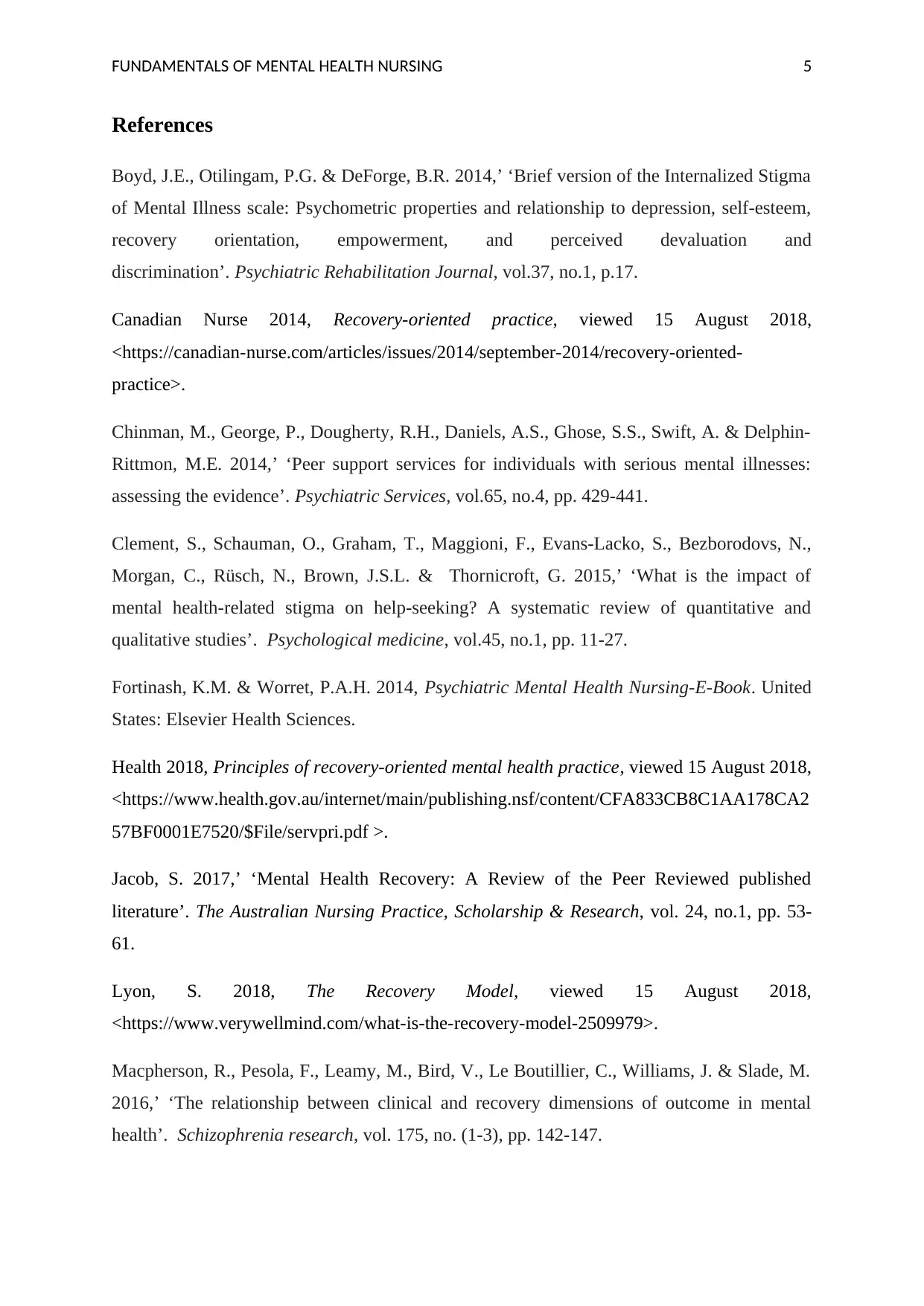
FUNDAMENTALS OF MENTAL HEALTH NURSING 5
References
Boyd, J.E., Otilingam, P.G. & DeForge, B.R. 2014,’ ‘Brief version of the Internalized Stigma
of Mental Illness scale: Psychometric properties and relationship to depression, self-esteem,
recovery orientation, empowerment, and perceived devaluation and
discrimination’. Psychiatric Rehabilitation Journal, vol.37, no.1, p.17.
Canadian Nurse 2014, Recovery-oriented practice, viewed 15 August 2018,
<https://canadian-nurse.com/articles/issues/2014/september-2014/recovery-oriented-
practice>.
Chinman, M., George, P., Dougherty, R.H., Daniels, A.S., Ghose, S.S., Swift, A. & Delphin-
Rittmon, M.E. 2014,’ ‘Peer support services for individuals with serious mental illnesses:
assessing the evidence’. Psychiatric Services, vol.65, no.4, pp. 429-441.
Clement, S., Schauman, O., Graham, T., Maggioni, F., Evans-Lacko, S., Bezborodovs, N.,
Morgan, C., Rüsch, N., Brown, J.S.L. & Thornicroft, G. 2015,’ ‘What is the impact of
mental health-related stigma on help-seeking? A systematic review of quantitative and
qualitative studies’. Psychological medicine, vol.45, no.1, pp. 11-27.
Fortinash, K.M. & Worret, P.A.H. 2014, Psychiatric Mental Health Nursing-E-Book. United
States: Elsevier Health Sciences.
Health 2018, Principles of recovery-oriented mental health practice, viewed 15 August 2018,
<https://www.health.gov.au/internet/main/publishing.nsf/content/CFA833CB8C1AA178CA2
57BF0001E7520/$File/servpri.pdf >.
Jacob, S. 2017,’ ‘Mental Health Recovery: A Review of the Peer Reviewed published
literature’. The Australian Nursing Practice, Scholarship & Research, vol. 24, no.1, pp. 53-
61.
Lyon, S. 2018, The Recovery Model, viewed 15 August 2018,
<https://www.verywellmind.com/what-is-the-recovery-model-2509979>.
Macpherson, R., Pesola, F., Leamy, M., Bird, V., Le Boutillier, C., Williams, J. & Slade, M.
2016,’ ‘The relationship between clinical and recovery dimensions of outcome in mental
health’. Schizophrenia research, vol. 175, no. (1-3), pp. 142-147.
References
Boyd, J.E., Otilingam, P.G. & DeForge, B.R. 2014,’ ‘Brief version of the Internalized Stigma
of Mental Illness scale: Psychometric properties and relationship to depression, self-esteem,
recovery orientation, empowerment, and perceived devaluation and
discrimination’. Psychiatric Rehabilitation Journal, vol.37, no.1, p.17.
Canadian Nurse 2014, Recovery-oriented practice, viewed 15 August 2018,
<https://canadian-nurse.com/articles/issues/2014/september-2014/recovery-oriented-
practice>.
Chinman, M., George, P., Dougherty, R.H., Daniels, A.S., Ghose, S.S., Swift, A. & Delphin-
Rittmon, M.E. 2014,’ ‘Peer support services for individuals with serious mental illnesses:
assessing the evidence’. Psychiatric Services, vol.65, no.4, pp. 429-441.
Clement, S., Schauman, O., Graham, T., Maggioni, F., Evans-Lacko, S., Bezborodovs, N.,
Morgan, C., Rüsch, N., Brown, J.S.L. & Thornicroft, G. 2015,’ ‘What is the impact of
mental health-related stigma on help-seeking? A systematic review of quantitative and
qualitative studies’. Psychological medicine, vol.45, no.1, pp. 11-27.
Fortinash, K.M. & Worret, P.A.H. 2014, Psychiatric Mental Health Nursing-E-Book. United
States: Elsevier Health Sciences.
Health 2018, Principles of recovery-oriented mental health practice, viewed 15 August 2018,
<https://www.health.gov.au/internet/main/publishing.nsf/content/CFA833CB8C1AA178CA2
57BF0001E7520/$File/servpri.pdf >.
Jacob, S. 2017,’ ‘Mental Health Recovery: A Review of the Peer Reviewed published
literature’. The Australian Nursing Practice, Scholarship & Research, vol. 24, no.1, pp. 53-
61.
Lyon, S. 2018, The Recovery Model, viewed 15 August 2018,
<https://www.verywellmind.com/what-is-the-recovery-model-2509979>.
Macpherson, R., Pesola, F., Leamy, M., Bird, V., Le Boutillier, C., Williams, J. & Slade, M.
2016,’ ‘The relationship between clinical and recovery dimensions of outcome in mental
health’. Schizophrenia research, vol. 175, no. (1-3), pp. 142-147.
⊘ This is a preview!⊘
Do you want full access?
Subscribe today to unlock all pages.

Trusted by 1+ million students worldwide
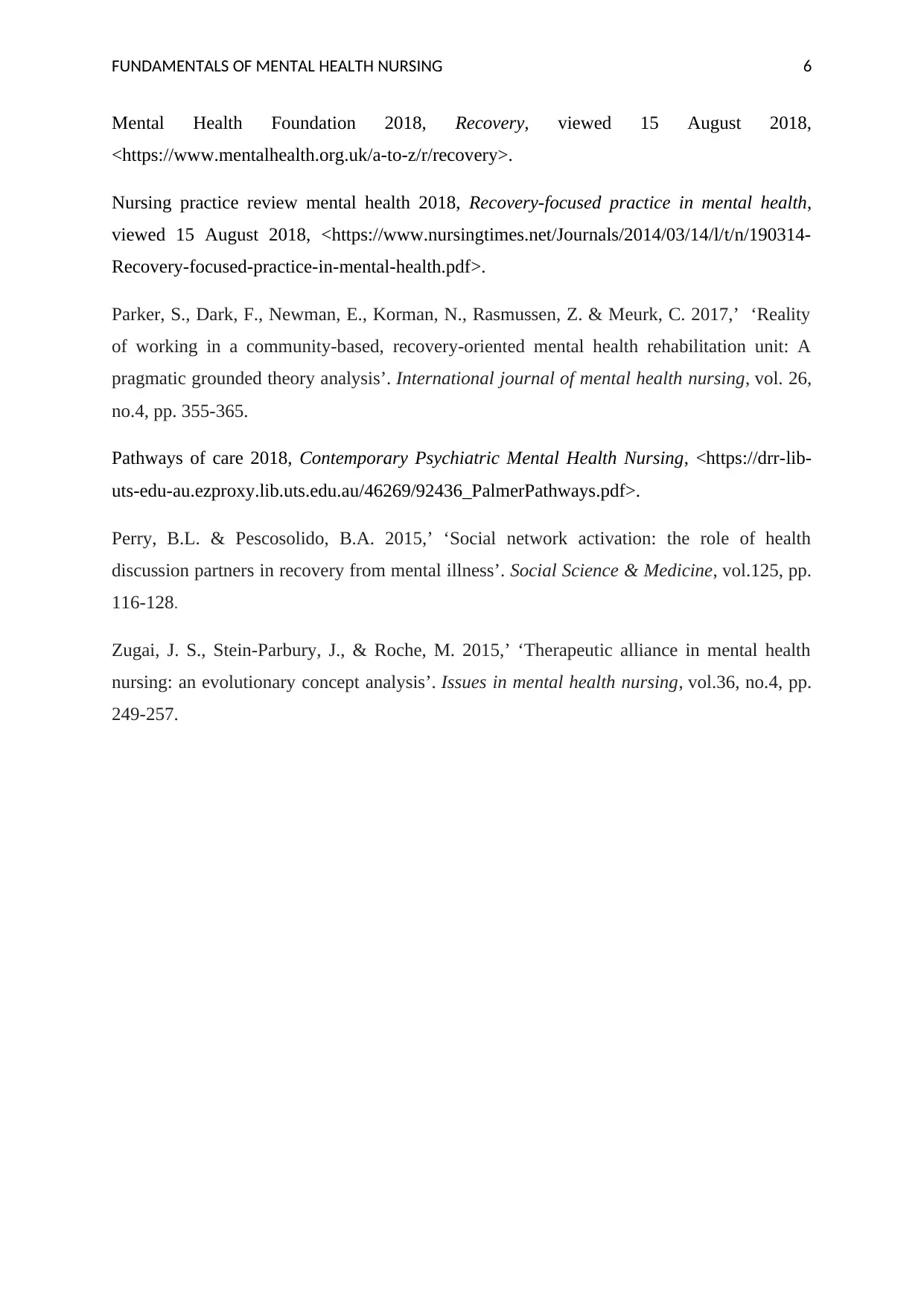
FUNDAMENTALS OF MENTAL HEALTH NURSING 6
Mental Health Foundation 2018, Recovery, viewed 15 August 2018,
<https://www.mentalhealth.org.uk/a-to-z/r/recovery>.
Nursing practice review mental health 2018, Recovery-focused practice in mental health,
viewed 15 August 2018, <https://www.nursingtimes.net/Journals/2014/03/14/l/t/n/190314-
Recovery-focused-practice-in-mental-health.pdf>.
Parker, S., Dark, F., Newman, E., Korman, N., Rasmussen, Z. & Meurk, C. 2017,’ ‘Reality
of working in a community‐based, recovery‐oriented mental health rehabilitation unit: A
pragmatic grounded theory analysis’. International journal of mental health nursing, vol. 26,
no.4, pp. 355-365.
Pathways of care 2018, Contemporary Psychiatric Mental Health Nursing, <https://drr-lib-
uts-edu-au.ezproxy.lib.uts.edu.au/46269/92436_PalmerPathways.pdf>.
Perry, B.L. & Pescosolido, B.A. 2015,’ ‘Social network activation: the role of health
discussion partners in recovery from mental illness’. Social Science & Medicine, vol.125, pp.
116-128.
Zugai, J. S., Stein-Parbury, J., & Roche, M. 2015,’ ‘Therapeutic alliance in mental health
nursing: an evolutionary concept analysis’. Issues in mental health nursing, vol.36, no.4, pp.
249-257.
Mental Health Foundation 2018, Recovery, viewed 15 August 2018,
<https://www.mentalhealth.org.uk/a-to-z/r/recovery>.
Nursing practice review mental health 2018, Recovery-focused practice in mental health,
viewed 15 August 2018, <https://www.nursingtimes.net/Journals/2014/03/14/l/t/n/190314-
Recovery-focused-practice-in-mental-health.pdf>.
Parker, S., Dark, F., Newman, E., Korman, N., Rasmussen, Z. & Meurk, C. 2017,’ ‘Reality
of working in a community‐based, recovery‐oriented mental health rehabilitation unit: A
pragmatic grounded theory analysis’. International journal of mental health nursing, vol. 26,
no.4, pp. 355-365.
Pathways of care 2018, Contemporary Psychiatric Mental Health Nursing, <https://drr-lib-
uts-edu-au.ezproxy.lib.uts.edu.au/46269/92436_PalmerPathways.pdf>.
Perry, B.L. & Pescosolido, B.A. 2015,’ ‘Social network activation: the role of health
discussion partners in recovery from mental illness’. Social Science & Medicine, vol.125, pp.
116-128.
Zugai, J. S., Stein-Parbury, J., & Roche, M. 2015,’ ‘Therapeutic alliance in mental health
nursing: an evolutionary concept analysis’. Issues in mental health nursing, vol.36, no.4, pp.
249-257.
1 out of 7
Related Documents
Your All-in-One AI-Powered Toolkit for Academic Success.
+13062052269
info@desklib.com
Available 24*7 on WhatsApp / Email
![[object Object]](/_next/static/media/star-bottom.7253800d.svg)
Unlock your academic potential
Copyright © 2020–2026 A2Z Services. All Rights Reserved. Developed and managed by ZUCOL.





